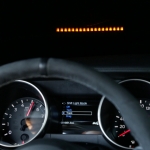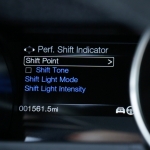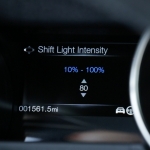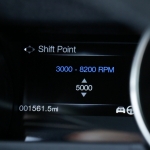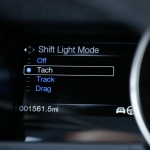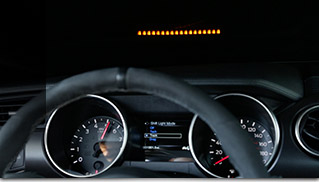 When driving the high-revving, 526-horsepower Shelby GT350® Mustang, drivers would do best to keep eyes on the road.
When driving the high-revving, 526-horsepower Shelby GT350® Mustang, drivers would do best to keep eyes on the road.
So that’s where Ford put the Performance Shift Light Indicator.
For decades, race drivers have used shift lights that signal the perfect engine speed for the shift point for maximum acceleration and lower lap times during the intensity of on-track driving.
Shift lights allow drivers to concentrate on the road in front of them rather than watching a tachometer. However, most shift lights either obscure the forward field of view or are located low in the instrument cluster where the driver must look down to see it.
The Performance Shift Light Indicator is a heads-up display located in front of the driver. It can be controlled through the driver information center in the gauge cluster, and customers can set shift points, light intensity, select from three different modes, or turn the feature off entirely.
In Tach mode, the amber LEDs light up sequentially from left to right as engine revs build to provide an easily viewable tachometer. Track mode is quite different – when engine revs build, LEDs light up from the outside ends to the center until the shift point is reached, then the whole LED bar flashes.
The third option is Drag mode. Much like Track mode, the customer sets the shift point, but in this configuration the entire LED light bar stays dark, then flashes repeatedly when the engine reaches the preset rpm threshold. “Given the conditions of a drag race, we found drivers wanted maximum simplicity in a performance shift light,” said Mike Makled, electrical engineer for Shelby programs.
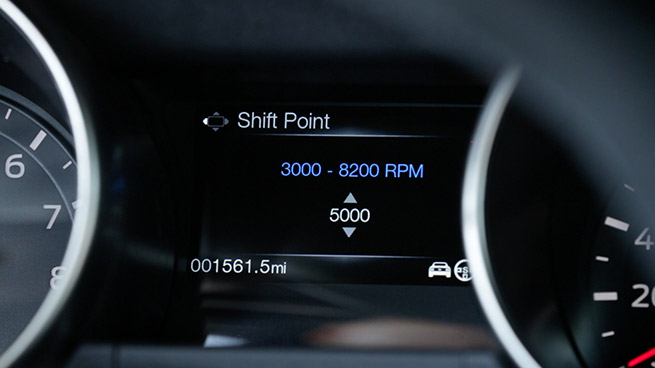
Innovation through lateral thinking
Makled is a self-described at-home tinkerer. The 10-year veteran and third-generation Ford employee has been with Ford Performance since 2010. “I like taking things apart, modifying how they work and creating new things,” he says. “It’s a hobby.”
Dreaming up innovative performance features is one of the fun parts of his job, and inspiration struck one day on the road. Makled was driving his Ford Taurus SHO when he came to a quick stop in traffic and the car’s collision warning with brake support system flashed its red LED heads-up display. The system bounces upward projected light against the reflective inner surface of the windshield so the driver can see it as a warning of impending danger. This got him thinking.
“I thought, ‘Wait a minute, why don’t we use that technology for our shift light on the GT350?’” said Makled. “With a few tweaks, it could have a big effect on high-performance driving.”
Over the course of three months, Makled worked with a supplier to build a new prototype with special circuitry, amber LEDs, and software he installed into his own car. When satisfied with the progress, he invited management into the driver’s seat to see what he’d been working on – they loved it, calling it a “brilliant reimagining of existing technology.”
After getting the green light, Makled handed the project over to then-Ford Corporate Graduate Zac Nelson for development and release. Nelson worked with OpenXC to quickly build a working prototype for driver testing and feedback. Makled and Nelson worked closely with the heads-up display supplier on the production-level software and display modes for the new Shelby GT350 and Shelby® GT350R.
The feature has been lauded by Ford testing personnel. “All of our drivers love this feature,” boasts Makled. “They can’t believe how much it reduces the distraction of having to look away to a tach or a shift light in the cluster.”
The Performance Shift Light Indicator is standard on the Shelby GT350 and GT350R.
Ford GT350 Performance Shift Light Indicator
Source: Ford
